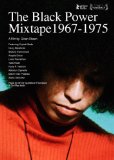| Reviews & Columns |
|
Reviews DVD TV on DVD Blu-ray 4K UHD International DVDs In Theaters Reviews by Studio Video Games Features Collector Series DVDs Easter Egg Database Interviews DVD Talk Radio Feature Articles Columns Anime Talk DVD Savant Horror DVDs The M.O.D. Squad Art House HD Talk Silent DVD
|
DVD Talk Forum |
|
|
| Resources |
|
DVD Price Search Customer Service #'s RCE Info Links |
|
Columns
|
|
|
Black Power Mixtape 1967-1975, The
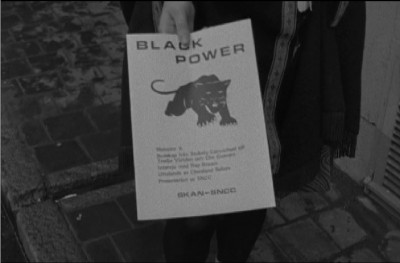
The title suggests a film on the musical peaks of Sly Stone, Jimi Hendrix, and Bobby Womack, but the tune that Goran Hugo Olsson's excellent documentary The Black Power Mixtape 1967-1975 plays goes far beyond the pop-cultural to resurrect the sense of tense, heightened awareness in the African-American community in the wake of the early-'60s civil rights movement and following the assassinations later in that decade of President John F. Kennedy, Dr. Martin Luther King, Jr., Malcolm X, and presidential candidate Robert F. Kennedy--all powerful advocates for black empowerment, all gunned down well before their work was done. The film documents (the contemporaneous documentation of) a galvanized community faced with the possibility of its hard-won, precarious advances slipping away, and in particular that community's rightly frustrated, angry, and increasingly radical activists, who are resolved not to let their goals of equality and empowerment evaporate and are committed to kicking back as hard as necessary against a tenacious oppression that seems intent on a violent fight to the death.
The film's provenance is not the U.S., but Sweden, the famously left-wing politics of which were at a sort of fever pitch (as intricately demonstrated by I Am Curious Yellow) at the time when its various segments were shot in the late '60s and early '70s. Journalists from Swedish TV were at the time making regular visits to the U.S. and reporting back on the superpower's inner turmoil, of which a major part was the ongoing strife and newfound militancy of America's perpetually beleaguered black community. Olsson has gone into the archives to compile (or "mix") a chronologically-ordered reel of this reporting, offering countless important, unguarded, up-close glimpses of the lives of African-American protesters and ghetto residents, and bringing back some voices that, in the wake of Dr. King's passive-resistance approach and untimely demise, were taking a critical look at what measures might be necessary to ensure progress and defeat racism--voices that are vaguely familiar but much less well-known or accepted than the great leader we celebrate the third Monday in January. First up is Stokely Carmichael, an activist and author of the movement-defining book, Black Power, who made his differences with King publicly apparent even before the assassination. Carmichael inspired and shared much of his militant, uncompromising ethos with the Black Panther Party, whose rise the film segues into from Carmichael's rousing, riling speeches and disarming glimpses of his downtime. We witness the party leadership at the height of their potency and prominence as the Swedes interview and document Bobby Seale, Huey Newton, Eldridge and Kathleen Cleaver (with an appearance by subsequent, less arms-focused and more education-focused spokeswoman Elaine Brown later on); we also see the results of the extreme backlash against the Panthers, with Bobby Seale on trial amid massive protests and the Cleavers exiled to Algeria under persecution from the U.S. government.
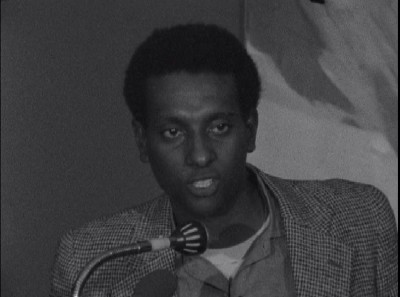
The film's "star," though (if that's not too triviliazing a word; she probably wouldn't care for it) is Angela Davis, whose story is told through footage of her own trial and the incensed protests surrounding it, as well as a very rare, lengthy interview conducted by the Swedish reporters while she was still incarcerated. Davis, a professor and activist, was put on the FBI's Most Wanted list and subsequently arrested and jailed for allegedly supplying the firearm that a fellow activist used to kidnap and murder a California judge and several others. What has now long since been established as Davis's wrongful, unfounded, frankly persecutory prosecution was, paradoxically, a boon for the black power movement: her case drew the attention and support of people from all over the world, making the "fear of a black planet" visible to many who had previously been unaware, and allowing her clear, incisive voice to be heard. That voice certainly stands out in The Black Power Mixtape's chorus of fascinating figures. Of all the mostly cogent, righteously fed-up activist campaigning and consciousness-raising Olsson has done us the invaluable service of preserving here, hers is the most articulate and the most truly radical, presciently looking behind the immediately obvious racial injustices to outline a scenario of pervasive, systematic class and privilege hierarchies that, given the groundswell of activism that continues to occur at the very moment I'm writing this, make the appearance of her pensive visage as the film's poster-and-DVD-cover emblem seem exactly the right choice, since evidence supporting the continuing relevance of her critique is bursting out all around us now that more and more of us, of all races, are feeling the entrenched economic disparity that has been a shamefully common and persistent feature of the black experience in America. That the film winds down, in 1975, on the rise of a young Brooklyn minister called Louis Farrakhan is sobering, damning not so much of that notorious anti-Semite and loon (who, having to follow Davis's sharp intellect in the mixtape's ordering, sounds even more glib and incoherent than usual) than of a racist society that, failing to heed the increasingly urgent, enraged, accurate warnings of the agitators that preceded him, made it all too predictable and understandable that downtrodden people would look for leadership from the one public figure who seemed sincerely and deeply interested in their interests and their futures, madman and/or con man that he may have been.
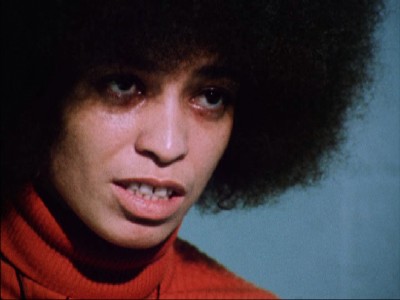
Olsson has also enlisted the voiced-over thoughts of contemporary proponents of African-American empowerment and critique of institutionalized racism, including rapper Talib Kweli, professor and Freedom Dreams author Robin Kelley, poet Sonia Sanchez, and singer Erykah Badu, in addition to current input/commentary from Angela Davis and Kathleen Cleaver. Combine all of that with a score by Om'Mas Keith and Ahmir Questlove Thompson that goes from a kind of laid-back funkiness to a menacing, quasi-Kraftwerk aural vibe, and you have a work as dynamic, intelligent, and captivating as most of what its subjects had to say when the cameras were, for once, on them and their concerns. The film even contains a stab at "fair and balanced" when the filmmakers interview a senior (white, natch) editor at TV Guide to give him a chance to explain his rag's cover story on European (particularly Swedish) TV's alleged "anti-Americanism." But for the most part, the interviewers are focused in on those whose views had been excluded from or marginalized in the ostensibly "objective" American news media. The Black Power Mixtape 1967-1975 does not try to achieve some sort of illusory balance between two supposedly equally informed, humane, valid views; it's too searing, the POV of both its participants and the documentarians too clearly based in too much lived, experienced, and/or witnessed knowledge of systematic injustice and imbalance, for that. Watching Olsson's film therefore feels more akin to having centuries of cobwebs and dust cleared away, revealing a long-obscured, painful, but necessary truth; or to hearing the elephant in a hushed, falsely polite room shatter the silence with a cry for the attention it deserves, has long been denied, and is, finally, demanding.
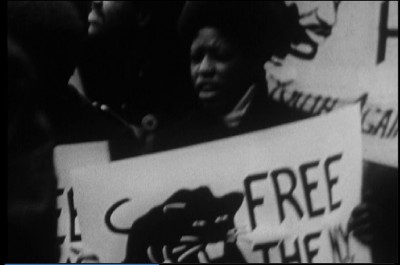
THE DVD:
The film's look is defined by the roughness of direct/vérité-style shooting for television circa the late '60s and early to mid-'70s (the format and period also indicating a 1.33:1 original aspect ratio, which is maintained here), and the grain and flicker of much of the footage is a natural part of the experience. A surprising amount of it, however--particularly some of the later color stuff, which appears relatively bright and smooth--looks remarkably well-preserved, and the transfer itself, though it retains some of the par-for-the-course, aesthetically appropriate rawness of the source material, is clearly the result of the utmost conscientiousness, with no compression artifacts or other transfer flaws to be seen.
Sound:The Dolby Digital 2.0 soundtrack is delivers the film's every sonic texture perfectly, from the old-fashioned, one-track, sometimes inherently muffled or crackly-sounding (but always clearly audible) sound recording of the archival footage that makes up the bulk of the film to the deep, full, immediate, newly-recorded resonance of the current voice-overs and the original score.
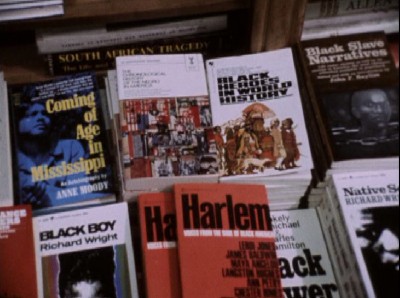
--A 10-minute segment on the 1975 case of Joan Little, a poor, underprivileged, imprisoned black woman put on trial for murdering a prison guard who raped her. The case galvanized the black community; Angela Davis certainly has some things to say about it here, and the only reasons one can imagine for its omission from the feature are either length considerations or fear of losing the particular importance of Little's case (surely a worthy and complicated enough subject to warrant a film of its own) among the film's many stories.
--The full 15-minute segment on Stokely Carmichael that was excerpted for the feature.
--Two full half-hour episodes of the Swedish television news program "World in Focus": one on Angela Davis, selections from which feature prominently in the main feature, and one on 1972 female, African-American presidential candidate Shirley Chisholm that does not appear at all in the final cut, possibly because Chisholm's story, easily deserving of a full-length exploration, got a very good one in Shola Lynch's 2004 documentary Chisholm '72: Unbought and Unbossed.
--The full 10-minute segment on Louis Farrakhan from which footage for the film's Farrakhan sequence was excerpted.
--The film's theatrical trailer, along with several others for additional IFC/Sundance Selects releases.
FINAL THOUGHTS:An outsider's view of the U.S. racial crisis at a long eight-year boil of rage, defiance, and possibility, The Black Power Mixtape 1967-1975 is a documentary that offers, if not mythical "objectivity," a higher degree of disinterestedness, more perspective, and more straightforwardness than much of what we seem willing or able as a nation and society to remember and examine in ourselves when it comes to that perpetually tense and divisive issue. It is an endlessly engaging, provocative reminder of the complexity of the problem, its long and insidious history, and a not too long-ago moment when the true urgency of the matter was being pushed out in the open and made undeniable--and was not quite so liable to be parsed, manipulated, diminished, and pushed through a 24/7 media shredder onto the back burner and into obscurity. A disclaimer at the beginning of the film warns that it does not presume to represent the whole of the black power movement or the African-American experience of the time, but what it does offer is actually more valuable than any survey-course comprehensiveness: it brings back to light and preserves important testimony and pieces of American history that have been virtually lost or too readily forgotten, and in doing so exemplifies the important work--not just of recording, but also of witnessing and remembering--that gives the documentary form its real distinction and reason for being. Highly Recommended.
|
| Popular Reviews |
| Sponsored Links |
|
|
| Sponsored Links |
|
|
| Release List | Reviews | Shop | Newsletter | Forum | DVD Giveaways | Blu-Ray | Advertise |
|
Copyright 2024 DVDTalk.com All Rights Reserved. Legal Info, Privacy Policy, Terms of Use,
Manage Preferences,
Your Privacy Choices | |||||||









